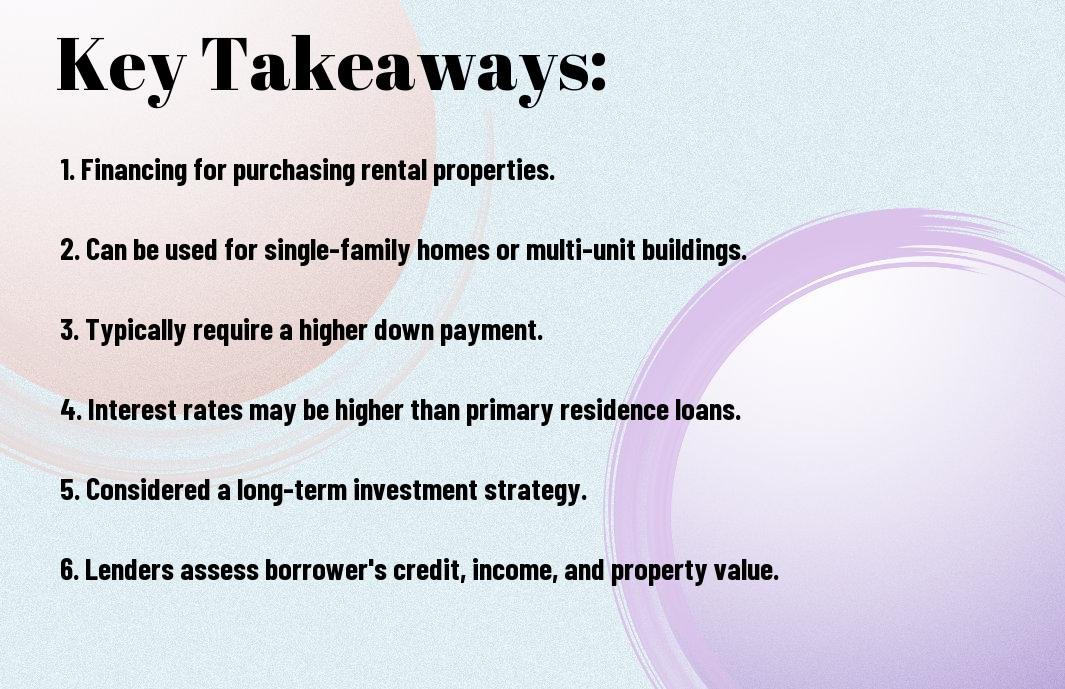Loans used for acquiring a rental property are a vital tool for real estate investors looking to grow their portfolios. These specialized financial products enable individuals to purchase residential or commercial properties with the intention of generating rental income. Understanding the ins and outs of rental property loans is crucial for those navigating the world of real estate investment. From interest rates, down payments, and potential risks involved, this post will examine into the crucial aspects of rental property loans to equip investors with the knowledge needed to make informed decisions.
Key Takeaways:
- Rental property loans are used by real estate investors to purchase or refinance properties that are intended to generate rental income.
- There are different types of rental property loans available, including conventional loans, FHA loans, and portfolio loans, each with its own eligibility criteria and interest rates.
- Qualifying for a rental property loan may require a good credit score, sufficient income to cover the mortgage payments, a low debt-to-income ratio, and sometimes a down payment of 20% or more.

Basics of Rental Property Loans
Definition and Types of Rental Property Loans
Now, let’s probe the fundamental aspects of rental property loans. These types of loans are specifically designed for real estate investors who want to purchase or refinance rental properties. There are various types of rental property loans available in the market, including conventional loans, FHA loans, VA loans, and hard money loans. Each type of loan has its own set of requirements and benefits, catering to different investor needs. This table breaks down the information on rental property loans:
| Loan Type | Description |
| Conventional Loans | Traditional loans offered by banks and mortgage companies. |
| FHA Loans | Loans insured by the Federal Housing Administration, ideal for first-time investors. |
| VA Loans | Loans guaranteed by the Department of Veterans Affairs, available to eligible military personnel. |
| Hard Money Loans | Short-term, high-interest loans secured by the property itself. |
This breakdown provides a clearer understanding of the options available for rental property financing. It is crucial to choose the right loan type based on your investment strategy and financial situation. Any miscalculation can affect your investment success in the long run.
Key Features of Rental Property Financing
For investors considering rental property financing, it is crucial to be aware of the key features that can impact your investment decision. Here are some crucial features to consider:
- Loan Amount: The maximum amount you can borrow.
- Interest Rate: The percentage of interest charged on the loan.
- Loan Term: The duration of the loan, typically 15 or 30 years.
- Down Payment: The initial payment made upfront.
- Qualification Requirements: The criteria you need to meet to qualify for the loan.
An understanding of these key features is vital when exploring rental property financing options. Any oversight in these aspects can have a significant impact on your investment profitability. It is recommended to thoroughly evaluate these features before making a financial commitment.
Qualifying for a Rental Property Loan
Credit Score and Financial Requirements
To qualify for a rental property loan, having a good credit score is crucial. Lenders typically look for a credit score of 620 or higher, although some may require a score of 700 or more for the best rates. In addition to a solid credit score, lenders will also examine your debt-to-income ratio, employment history, and overall financial health.
Income Verification and Property Analysis
Requirements for income verification and property analysis are stringent when applying for a rental property loan. Lenders will require documentation such as tax returns, pay stubs, and bank statements to verify your income. They will also analyze the potential rental income of the property through an appraisal and market analysis to ensure that it can generate enough cash flow to cover the mortgage payments.
Qualifying for a rental property loan involves meeting strict credit score and financial requirements. It is imperative to demonstrate stable income and have a solid financial background to secure approval for your loan application.
How to Choose the Right Rental Property Loan
Comparing Lenders and Loan Terms
For landlords looking to invest in rental properties, choosing the right rental property loan is crucial. When comparing lenders and loan terms, it’s vital to consider the interest rates, loan amounts, loan terms, and fees offered by different financial institutions. By shopping around and comparing multiple options, landlords can find a loan that meets their specific needs and financial goals.
Understanding Interest Rates and Fees
On the topic of interest rates and fees, landlords must be aware of the annual percentage rate (APR), loan origination fees, points, and prepayment penalties associated with rental property loans. This information can help landlords calculate the total cost of borrowing and assess the overall affordability of the loan. Landlords should also pay attention to any adjustable rates that could potentially increase over time, affecting their monthly mortgage payments.
This comprehensive understanding of interest rates and fees is critical in making an informed decision when selecting a rental property loan. Landlords should carefully review the terms and conditions of the loan agreement and seek clarification on any aspects that are unclear. Being aware of the potential costs and risks associated with the loan can help landlords avoid financial pitfalls and ensure a successful investment in rental properties.
Managing Your Rental Property Loan
After securing a Rental Property Loans at Flexible Terms for Investors, it is crucial to effectively manage your loan to ensure financial success.
Strategies for Repayment
Managing your rental property loan repayment involves implementing strategic financial planning. One effective strategy is to allocate a portion of your rental income towards paying down the loan. Another approach is to set aside a reserve fund to cover unexpected expenses or vacancies to avoid defaulting on your loan.
Refinancing and Loan Modification Options
Your rental property loan may come with the option to refinance or modify the terms. Refinancing allows you to secure a new loan with better terms, such as lower interest rates or longer repayment periods. Loan modification, on the other hand, involves changing the existing loan’s terms to make repayment more manageable. It is imperative to carefully consider these options and consult with a financial advisor to make the best decision for your investment.
Conclusion
To wrap up, rental property loans are a form of financing specifically designed for real estate investors looking to purchase or refinance rental properties. These loans can help investors grow their real estate portfolios and generate passive income through rental payments. By understanding the different types of rental property loans available and their unique features, investors can make informed decisions to maximize their returns and achieve their financial goals in the real estate market.
FAQ
Q: What are rental property loans?
A: Rental property loans are loans specifically designed for investors looking to purchase or refinance real estate properties that will be used as rentals. These loans are different from traditional home mortgages and are tailored to the needs of rental property investors.
Q: How do rental property loans work?
A: Rental property loans work by providing investors with the funds needed to purchase or refinance rental properties. These loans can be used to finance single-family homes, multi-unit properties, condos, or commercial real estate. Investors make monthly payments towards the loan, which typically include principal and interest. The rental income generated from tenants can help offset these loan payments and potentially generate positive cash flow.
Q: What are the requirements for getting a rental property loan?
A: Requirements for rental property loans can vary depending on the lender, but generally, investors will need a solid credit score (typically 620 or higher), a low debt-to-income ratio, and a down payment ranging from 15-25% of the property’s purchase price. Lenders may also consider the property’s potential rental income and the investor’s experience in rental property management. It’s important to shop around and compare offers from different lenders to find the best terms for your rental property loan.

